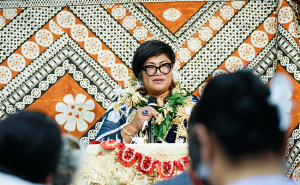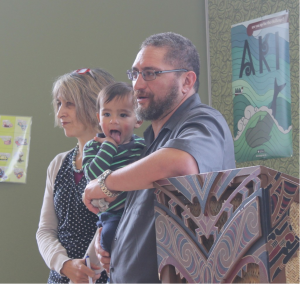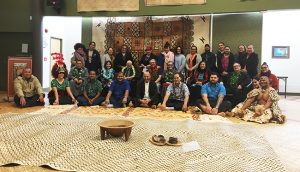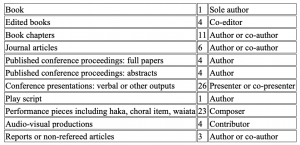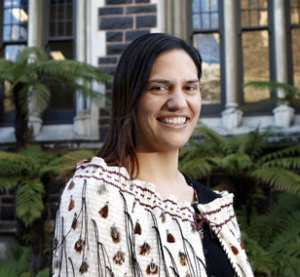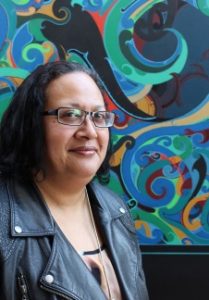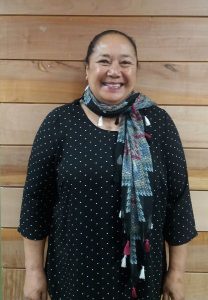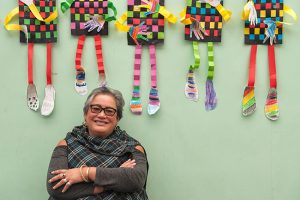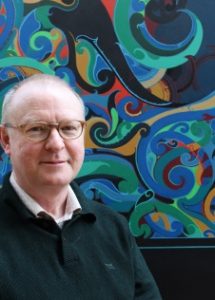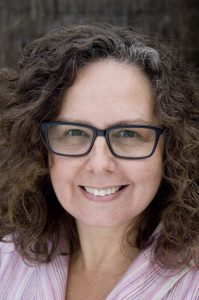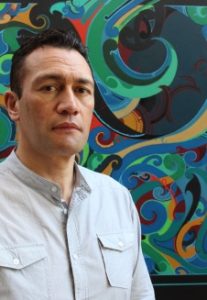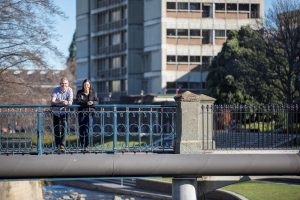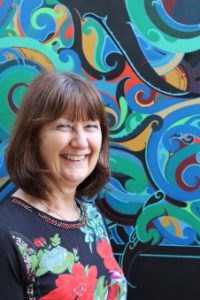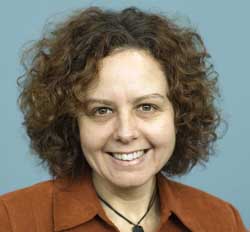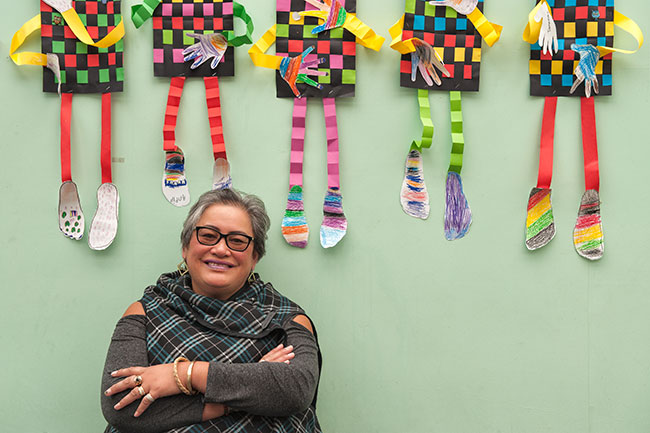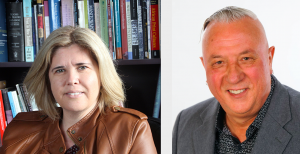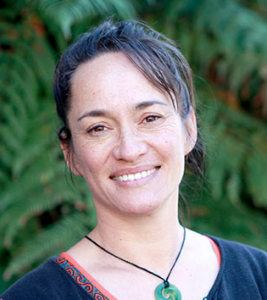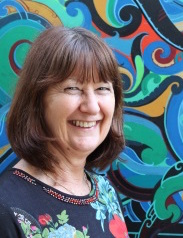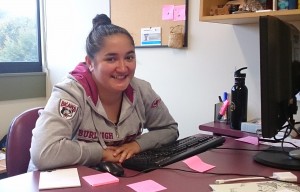Wonderful achievement for Te Tumu PhD candidate
Te Tumu PhD candidate Wanda Ieremia-Allan is now bound to the UK on a University of Cambridge fellowship to research the historical legacy of the Samoan periodical, O Le Sulu Samoa, a newspaper that has been active for 184 years.Otago’s Bulletin Board wrote a great article on Wanda’s achievement and the background of her interest in this newspaper. Click here to read more.
Fast-Start Marsden on Niuean Texts
Fakaalofa lahi atu!
Congratulations to Dr Jess Pasisi on being awarded a FastStart Marsden grant worth $360,000, entitled “Mapping Niue texts in and beyond Aotearoa: Expanding on New Zealand Realm connections to Niue through archival texts.” Jess (Niuean (Mutalau, Hikutavake), Pākehā, Ngāti Pikiao, and Tahitian) is Te Tumu’s most recent academic hire and is based in our Pacific Islands Studies programme, and is already a promising researcher, having been awarded a Pacific Health Postdoctoral Fellowship by the Health Research Council to investigate Niuean happiness.
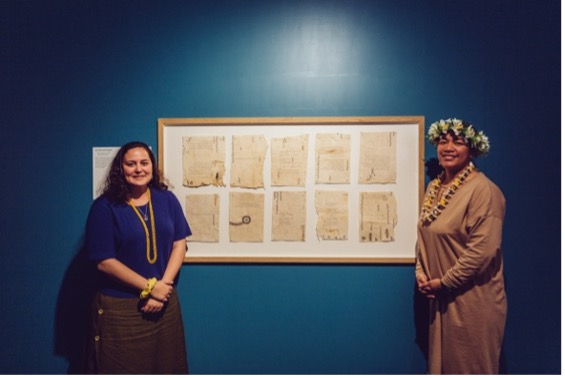
Jess Pasisi (L) and Cora-Allan Lafaiki Twiss at the Auckland Museum exhibition launch of “Archives of Emotion” in 2021, with their piece ‘Ko e Higoa Haaku ko Hiapo’. Photo courtesy of Auckland Museum.
Jess started putting the Mapping Niue texts project together while still based at the University of Waikato, with Professor Alice Te Punga Somerville as Associate Investigator. Professor Somerville has also moved, and is now at the University of British Columbia. She is well versed in literary projects, and Jess worked as a researcher with her in the “Writing the New World” project.
Jess’s Marsden project will be uncovering and analysing Niuean texts – with the meaning of “texts” interpreted quite broadly, comprising publications, manuscripts and other tāoga – with the aim of making these more available to Niuean people in Aotearoa New Zealand, Niue, and beyond. This also involves collaborating with Niuean communities, including cross-disciplinary work with tufuga (experts, practitioners), and encouraging Niuean people to engage with their local archives.
Research outputs include a book based on the project’s research, and the creation of a dataset of Niuean texts which will be invaluable to the wider Niuean community, as well as incoming researchers. Jess is planning three workshops as part of the project, one at Otago, one in Niue, and one at an international venue. Aligning with the aims of Marsden Fund to help develop future scholars, the project will also fund a Masters thesis scholarship, as well as some undergraduate summer scholarships.
We wish Jess well with her exciting new research project, and for a long productive career in academia.
Please also check out the Marsden Fund article for more details on Jess’s research.
Image information. Jess Pasisi wrote the poem for ‘Ko e Higoa Haaku ko Hiapo’ and Cora-Allan Lafaiki Twiss, a tagata Niue artist and practitioner, made it into an art piece that was purchased by the Auckland Museum. To read the poem, see images of the artwork, and more information, click here.
Te Tumu’s First Professor Emeritus
Poia Rewi (Ngāti Manawa, Tūhoe, Te Arawa, Ngāti Whare and Tūwharetoa) was appointed as a Senior Lecturer in Te Tumu, School of Māori, Pacific and Indigenous Studies at the University of Otago in 2003. Previously he had been a Māori Studies academic at the University of Waikato from 1992. In 2016 he was promoted to professor. He ended his service at Te Tumu in mid-2020 in July 2020 when he took up the role of Chief Executive/Tumu Whakarae of Te Mātāwai, a government organisation established under Te Ture mō Te Reo Māori 2016/The Māori Language Act 2016, to foster and support Māori language development for iwi.
Although the honour of professor emeritus is normally awarded to professors retiring from academia, the University’s Policy for the Award of the Title of Emeritus Professor allows the title to be made to a Professor who resigns, for example, to take up a distinguished public position. Poia’s illustrious academic career (discussed below) and his leadership within Te Tumu and the university induced Professor Michael Reilly and other Te Tumu colleagues to seek this honour for our recently departed Dean.
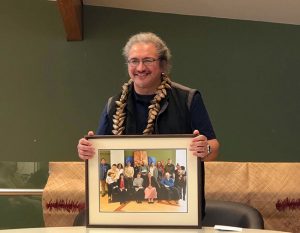
Professor Poia Rewi at his farewell at Te Tumu, 24 June 2020, with a photo featuring his Te Tumu colleagues.
Speaking to the Otago Bulletin Board on Poia’s departure in July last year, Professor Reilly described Poia as a “deeply humble, modest man who believes that it is for others to speak of the kumara’s sweetness.”
“His abiding passion is always first and last, te reo Māori. He advocates for its use by all New Zealanders. In his teaching and writing he always encourages his students and others to seek out and to utilise the rich diversity of language forms that the reo has inherited from the ancestors.”
“In Te Tumu Poia was generous with his time and showed hospitality to all. He became well known for volunteering to work in the kitchen, always concerned to ensure visitors, staff and students had plenty of food; a mark of the true leader, one who always thought of the well-being of others.”
Poia places much value on the importance of teaching the new generation, and work within the community. The growing success of his postgraduate students attests to his influence, and in 2012 he received the Otago University Students’ Association Supervisor of the Year Award. His knowledge of the reo and Māori performing arts resulted in him being appointed a judge at many regional Māori-language speaking competitions as well as being a judge at national, regional and tribal Māori performing arts competitions (adult/senior and high school levels).
Te Reo Māori has always been his passion. In 1997 he received a certificate as a translator and interpreter of te reo Māori from Te Taura Whiri i Te Reo Māori/The Māori Language Commission. This is an exceedingly hard qualification to attain and demonstrates his high level of proficiency in the Māori language. In 2005 Poia completed the first PhD solely in Te Reo Māori at the University of Otago. It was a study of whaikōrero or Māori oratory through the words of a group of some 30 respected elders, many of them highly regarded orators on the marae throughout the country.
Subsequently, he revised and translated the thesis into English for publication as Whaikōrero: The World of Māori Oratory, published by Auckland University Press in 2010. This book was the first major publication to study this major Māori art form. In 2011 it was awarded the New Zealand Society of Authors – E. H. McCormick Best First Book Award for Non-Fiction. Later, it became the basis for a 12 part Māori Television documentary, ‘Whaikōrero’, which won the Broadcasting-Māori medium category in Ngā Tohu Reo Māori 2014/the Māori Language Awards 2014.
As a researcher his dominant focus has been Te Reo Māori and the associated performing arts. As a teacher of the reo to second language learners he has always been interested in the revitalisation of the reo and this became the centre of his research in more recent years. In 2010 he was a lead investigator for two major grants from Ngā Pae o te Māramatanga, a national Centre of Excellence: ‘He Iho Reo, Developing a toolbox to support Māori Language Transmission and Maintenance’ ($226,439), and ‘Te Pae Tawhiti: “Te Kura Roa,”’ a jointly commissioned research project with Rāwinia Higgins of Victoria University of Wellington ($1,500,000). A number of reports and publications were generated from these grants including
- Day, D & Rewi, P., ‘Te Kura Roa wānanga wawata: Inter-department Specific- enablers/inhibitors’, 2013. Twelve individualised reports distributed to each of the 12 participating Government departments, approximately 667 pages.
- Higgins, R., Rewi, P., Olsen–Reeder, V. (eds.), The Value of the Māori Language: Te Hua O Te Reo Māori, Wellington: Huia Publishers, 2014,
- Day, D., Rewi, P. & Higgins, R. (eds.), The Journeys of Besieged Languages, Newcastle upon Tyne, UK: Cambridge Scholars Publishing, 2016.
Further to his academic pursuits, Poia has been a prolific writer of Māori narrative over the years manifesting in published works as haka compositions, waiata, Māori language plays, fiction and nonfiction. This has resulted in several texts published in the Pikihuia short stories series. Poia himself has also adjudicated the Pikihuia Māori writers’ awards for a number of years. His most recent writing accolade was acknowledged in 2020 for a te reo Māori text.
Poia has completed 86 outputs, as shown in the summary on the left.
Poia served as Dean of Te Tumu between 2015 and 2020. Another significant leadership role at Otago was as Associate Dean Māori, Division of Humanities, 2012-2014. He was also Deputy Director of Ngā Pae o te Māramatanga, a national Centre of Research Excellence, between 2018-2020.
His recognition as a leader in the Māori world was evidenced by his service as Acting Chief Executive of Te Taura Whiri i Te Reo Māori/The Māori Language Commission from 2014-2015. He was also a member of the Commission’s Board between 2012-2015. This outstanding service within, but also outside the university, helped pave the way to his new role at Te Mātāwai. Poia was elected in 2021 as a Fellow of the Royal Society of New Zealand Te Apārangi, “celebrated as one of the most active research specialists in Māori culture, language revitalisation, oral history and performing arts.” Yet, due to his modesty, even some of his Te Tumu colleagues had no idea of the extent of his scholarship.
Poia Rewi always said when he first came down to Otago 18 years ago he had only wanted to stay for a few years before heading back up to the North Island. We knew that he was only on loan to us, and it was an honour to have him for the time that that we did. E hoa, me kore ake koe hei ārahi i a mātou, arā, i ō hoa mahi o Te Tumu me te whare wānanga, i te ao Māori kei waho o te whare wānanga, me ngā tini tāngata e kimi ana, e whakaū ana, e whakapiki ana i te reo Māori.
[Thanks to Professor Michael Reilly and Dr Tangiwai Rewi for information for this post.]
2020 Te Tumu Research Round-up
Well, it’s been a weird year for everyone, and the coronavirus certainly made our work harder, with a lot of our energy going into making sure we were able to still offer quality teaching to our students. We have also had a number of staff move on to greener pastures: Jim Williams and Lyn Carter retired; Gianna Leoni left us to take up a research role with Te Hiku (where former colleague Suzanne Duncan also works); Megan Pōtiki has shifted to the Office of Māori Development in the university; and Poia Rewi has taken up the Tumu Whakarae (CEO) position at Te Mātāwai. So we are expecting to see a bunch of fresh faces in the new year.
Research has still carried on. As the Chair of our Research Committee, Michelle Schaaf says, “Despite Covid, the retirement and departure of staff; the research committee’s commitment to building a successful research culture continues and owes its success to the oversight and guidance provided by senior staff directly. The committee continues to monitor staff research activity and promotes staff research through various mediums: research website long running and informative Research Blog.”
We also asked staff to tell us about their research, and what they’ve been up to. Here are their replies.
Karyn Paringatai’s Marsden
Karyn is lead investigator on the Marsden project: E kore au e ngaro! The enduring legacy of whakapapa (awarded $823,000), which looks at the importance of whakapapa in health, in particular to whānau that carry the cancer-causing hereditary mutation in the CDH1 gene.
2020 started with good intentions to advance my Marsden research with a lot of face-to-face engagement sessions planned, but those plans fizzled quickly during the March-April lockdown. But things have picked up during the second half of the year with a lot of gusto. In September I met with Maybelle McLeod, Pauline Harawira and Erin Gardiner from Kimihauora Health and Research Centre in Tauranga to co-develop a research topic for future PhD student, Kahurangi Salu. Pauline and Maybelle were two of the four lead investigators of the research project that discovered the CDH1 gene mutation. A conversation with Pauline went as follows:
Pauline: “My mother was from Hicks Bay.”
Me: “Oh wow.”
Pauline: “Yeah her younger brother, we called him Uncle Boy, his first name was Manuhou. His middle name was Paringatai. He was named after that koroua that died in the war.”
FUN FACT: My whānau are based just over the hill from Hick’s Bay. My daughter is called Manuhou Paringatai. She was named after that same koroua who died in the war, my grandfather’s first cousin. Whakawhanaungatanga – well and truly achieved.
Check out this short video featuring Karyn and the wider project.
This meeting coincided with a wider whānau hui. It was an opportunity to speak to whānau, canvas opinions, make connections, and recruit participants. The concerns they expressed were echoed in my research objectives. As a result I have been involved in developing a post-surgery nutrition research project and a funding proposal for a Kaihautū – someone who will help develop a pre- and post-surgery management care plan that takes in to account Māori realities. Watch this space……
Michelle Schaaf’s research
The Covid pandemic really pushed me to think of what the different ways are, that I could have students demonstrate what they know. There’s been a lot of me letting go of control, to try and build resilient and more-independent students. Teaching remotely also made me look at my own course content with fresh eyes. In terms of my research, I was forced to be adaptable, and implement strategies to mitigate the long-term impact of research disruptions.
new Publications
UORG: “Childhood in a changing Pacific”
Freeman, R.M. Schaff, C. Ergler, M. Kivalu, A. Niusulu, T. Tua’a and H. Tanielu, Childhood in Changing Pacific’ Summary Research Report August 2020, (Summary Research Report), Dunedin: School of Geography, University of Otago.
Childhood in Changing Pacific’ Summary Research Report Presentation and Exhibition. 10 November 2020. This was a report presentation to participants and their families, in Dunedin and Samoa, on campus and via zoom platform. See here for more.
Articles submitted
“Kinship and belonging: Pacific children’s perspectives on the diaspora” to the Childhood Journal.
“Connections to community and culture, a photographic analysis of place attachment amongst Pacific Island children” submitted to Children’s Geographies.
Telesia Kalavite’s latest article
Telesia has recently published an article, “Toungāue cooperative pedagogy for Tongan tertiary students’ success” in the Waikato Journal of Education, 25, 1 (2020). You can read it here.Toungāue cooperative pedagogy
Abstract
Cooperative Pedagogy specific to Tongans can enhance students’ academic success in New Zealand’s tertiary education. Tongan students’ success depends on teachers’ recognition and understanding of Tongan students’ sociocultural context which involves their pule‘anga (bureaucracy), famili/kāinga (family), siasi (church) and fonua (country) relationships. Tongan students should not be treated within the Pacific groupings because ‘Pacific’ is a term of convenience for peoples who originate from different countries in the Pacific region whose cultures are uniquely different from one another. The term ‘Pacific’ tends to make these students live in the shadow of being treated as if they have the same needs in the classroom. The culturally specific needs of Pacific students are obscured by the assumption that they are homogenous. Academics and educational authorities in New Zealand need to recognise the importance of Pacific students’ culturally specific needs in their educational environments to move towards solving the problems of underachievement. This article explores the use of a culturally specific Tongan Toungāue Cooperative Pedagogy for teaching Tongan students in New Zealand tertiary education. Toungāue Cooperative Pedagogy is rooted in Tongan students’ sociocultural context which is at the heart of the Tongan society. More importantly, this proposed Toungāue Cooperative Pedagogy is transferable and could also be beneficial to other Pacific and Indigenous cultures.
Keywords
Toungāue cooperative pedagogy; Tonga tertiary students’ success; Pacific diversity; Pacific ethnic special needs.
Tangiwai Rewi’s projects.
Most of the research related mahi I have been consumed by since 1 July has involved the 0.2 FTE Ngā Pae o Te Māramatanga co-management of the Te Pāpanga Te Reo Māori, Ngā Tikanga Māori (TRMNTM) mahi along with Dr Gianna Leoni with the departure of Professor Poia Rewi. The list includes:
- Running a Te Kōrerorero a Ngā Tumu Whakarae webinar hosted on the last day of Māori Language week 18 September 2020 to encourage eight CEO’s to share their ideas about working together for te reo Māori research under Te Papa Kōrero. The purpose of Te Papa Kōrero is to provide coordination and leadership for the implementation of both Maihi (Maihi Māori and Maihi Karauna) in respect of the Māori language strategy. We managed a 50% success rate by confirming Shane Taurima (Māori Television), Larry Parr (Te Māngai Pāho), Dr Poia Rewi (Te Mātāwai) and Ngahiwi Apanui (Te Taurawhiri) to participate in the session facilitated by Dr Gianna Leoni and myself (from Te Tumu at the University of Otago), in our roles as the NPM Co-Managers of Te Reo & Ngā Tikanga Māori Platform. We aim to invite the other four Chief Executives of Te Puni Kōkiri; the Ministry of Education; the Ministry for Culture and Heritage and the Department of Internal Affairs, who were unavailable on this occasion, to join another webinar at a later date.
- N03 Project Te Reo me ngā Tikanga Māori – Named Scholarship – Professor Wharehuia Milroy; Understanding, articulating and measuring the language shift at the micro-level As part of the Ngā Pae o te Maramatanga Summer Internship Projects 2020-21 we were asked to develop, organise and then manage and supervise this named scholarship to recognise the scholarship and leadership of the late Te Wharehuia Milroy to the revitalisation and normalisation te reo me ngā tikanga Māori. In doing so, the intern will review and develop an understanding of Milroy’s research and scholarship, that is specific to te reo Māori normalisation and excellence. Dr Gianna Leoni will be the NPM Investigator who will work alongside Ria Tomoana (Kaiwhakahaere Rangahau – Te Mātāwai) to supervise the student.
- The third project we have been doing is our Collectivising Ngā Pae o Te Māramatanga Publications which we presented on at the 9th Biennial International Indigenous Ngā Pae o te Maramatanga (NPOTM) conference online 18-20 November. In three phases, the first produced punchy, attention grabbing abstracts summarising the articles.The second attributes keywords to the articles along with word clouds. To ensure accessibility after these two phases, the third phase thematicises the lists so that any person wanting to know what articles are published in each issue can search via content themes. Phase 1 comes to an end this year while phases 2 and 3 will look at completion by end of April 2021.
On a personal research note:
- I continue to push through with my Tuupuna Times research project holding wānanga for whānau and hapū on request, on how to collect stories from their tuupuna.
- My research plan for RSL is a little off beam given the attention to the Ngā Pae o Te Māramatanga workload. However, the next two months will be busy getting that back on track, assisted gratefully by the Te Koronga continued funding support of $5000 development grant this year and recent success with my UORG application He Whakapakari Ake i Te Tuakiri Maaori of $11, 434 which takes effect 1 January 2021.
- I contributed a Māori perspective to a paper, Ko tā te Māori aronga ki te whakamātao kikiri. A Māori perspective on embryo cryopreservation, which is currently being reviewed by the lead author.
- I still have two articles to complete by the start of next year!
That’s it!
What is Michael Reilly doing?
Since 2019 I have off and on been working on a Māori tribal history manuscript. It currently is organised around the chief themes of tribal traditions: creation, culture heroes, the waka migrations, and the stories about the many generations of descendants who settled and populated this new country. The latter extends over a wide range of topics such as rangatiratanga or leadership; mana wāhine, mana tāne or gender relationships; and possibly, the place of emotion words such as whakamā, or shame, and pōuri, or grief. Each chapter is organised around a selection of traditions on the topic from different iwi. Attention is paid to southern traditions where possible. These traditions are normally taken from published sources, often collections of traditions with a limited analysis or explanation of the content of the narratives.
My aim is to provide the cultural context of these stories in order to help the modern reader understand the layers of meaning found within each text. This often involves an immersion in older ethnographic works by the likes of Elsdon Best, Te Rangihīroa and Raymond Firth who put on record information shared with them by generations of Māori scholars. By locating the texts within this ethnographic record, I can better peel back the layers of meaning found in each of the stories. To me, it opens a window upon that ancient world of the ancestors, Te Ao Kōhatu, the Stone World, as Bruce Biggs once described it. This approach resembles the kind of work I have been pursuing for some years, both in Aotearoa and in the wider world of Ancient East Polynesia, notably Mangaia.
Behind this approach lies an influential model: Erich Auerbach’s Mimesis: The Representation of Reality in Western Literature. He began writing it while in exile as a German Jew teaching in Turkey during the Second World War. Each of his chapters selects a passage from an author, from Homer through to Virginia Woolf. He uses each of them to explore ideas about how Western literature has sought to represent the world. His aims differ from mine but some of his methods have encouraged me to try and explore the totality of Māori traditions from its beginnings in time down perhaps as far as the edgy beginnings of modern Aotearoa, ending however, in the early nineteenth century when Māori understandings of their world remained dominant. For it is their story after all I am interested in.
More recently, I have initiated other smaller projects after approaches to provide publications either for edited books or journals. One looks at emotions in Oceania, drawing on selected texts from particular Island societies, including Mangaia and Aotearoa, that illustrate important concepts such as love, shame and grief. I am also interested in comparing the different words used to describe the human organ or centre of emotions, such as ngākau and manawa.
Currently, with the help of a research assistant, Jade Higgan McCaughan, I am examining evidence found in the songs published in the four volumes of Ngā Mōteatea, edited by Apirana Ngata and other scholars. Another project was prompted by plans to celebrate the coming of the London Missionary Society to the Cook Islands. I decided to look at some letters by a 19th century Mangaian church minister, Mamae. In one he describes his experience of a hurricane, while in others he gently criticises the editing of local texts by his colleague, William Wyatt Gill; an interesting case of the native speaking back. We see Mamae as a skilled writer who is actively participating not only in the recording of traditions, but also in how it is presented in published form. These kinds of letters give a window into the work and contributions of an important early scholar and missionary whose name, however, is far less well known that Gill’s, for it is the latter’s name that appears on the title pages of the ethnographic studies these two men collaborated in producing.
All this work takes place in the small intervals of relative calm permitted to me when I am not busy either teaching or discharging the responsibilities of Acting Dean of Te Tumu, a role bequeathed to me by Poia Rewi on his departure for Te Mātāwai in Te Whanganui-a-Tara.
Erica Newman’s exciting new project
Erica is lead investigator in a new fast-start Marsden project beginning in 2021: Journey Home: Descendants of Maori adoptees search for their turangawaewae. Only researchers who have recently completed their PhDs are eligible to apply for a Fast Start Marsden grants.
This research will investigate the ripple effects of the 1955 Adoption Act from which some Māori adoptees grow up not knowing their whakapapa, and look at the journeys that some of their descendants undertake in the search for their tūrangawaewae. Erica’s project has already attracted quite a bit of media attention, on te aka kumara, and waatea news, which is useful for getting the project out there to the descendants who may want to make contact with Erica. There is also a closed Facebook page just started, “Descendants of Māori Adoptees”, a safe space for these descendants to ask questions, share stories and support each other.
Erica was also asked to come on the team of the Marsden-funded project, Te Hau Kāinga: Histories and Legacies of the Māori Home Front, 1939-45, to contribute research on tikanga, whānau and adoption
Erica teaches in some large classes, and says that she found challenging converting on-campus papers to on-line. “This year has been quite draining with covid, and the future is a little unsettling when thinking about teaching, not knowing whether we will (or won’t) go into more lockdowns next semester.” But she is keenly looking forward to getting into her research.
Dr Paerau Warbrick’s goings on
In terms of research this year, I have been beavering away at articles.
Recently I have had an article accepted by the Australia & New Zealand Law & History journal, which will be published later in 2021. It is on Māori and Citizenship. And it takes a look at what this phrase ‘citizenship’ meant for Māori up until the 1950s.
My research is taking on a distinctly historical political flavour, on the heels of my 2019 article in the New Zealand Journal of History about Māori elections in the nineteenth century.
I have finished a chapter for a book edited by Lachy Paterson, myself and Megan Pōtiki on Māori texts, contexts, and their resonances for today. This chapter looked at Hēnare Tomoana, MP for Eastern Māori 1879-1884, and his pivotal role in the fall of George Grey’s Government in 1879.
Recently I submitted an article to the Journal of New Zealand Studies. It looks at the two Māori Election Petitions that try to unseat the MPs Karaitiana Takamoana (Eastern Māori) in 1876 and Hone Mohi Tāwhai (Northern Māori) in 1879. In order to understand these petitions, you really have to come to grips with the complex wider political machinations of the Fox, Vogel and Donald McLean political blocs, and the George Grey and John Hall group of MPs in Parliament.
Currently, I am working on an article for the Journal of Polynesian Society on the monumental election battles between Wi Pere and James Carroll over the Eastern Māori seat between 1884-1890. It is an attempt at historical psephology where I use fragmented polling booth data to uncover complexities in the Māori communities in the Eastern Māori election. I am looking at submitting this to the journal by mid-December 2020 or more realistically late January 2021.
This past year has definitely been a challenge for everyone. I wish everyone a safe and reflective Christmas and New Years. Mauri ora koutou.
Lachy Paterson’s doings
Lachy is lead investigator, with Angela Wanhalla (History) on the Marsden-funded project: Te Hau Kāinga: Histories and Legacies of the Māori Home Front, 1939-45, looking at what life was like for Māori in New Zealand during the Second World War, and how these experiences shaped Māori society in the years following the war. He is currently on RSL.
This project incorporates a large team. Alongside Angela Wanhalla and I, we have Erica Newman (as discussed above) as research associate, and five research assistants (one of whom is based in Wellington, and another in Auckland). We’ve also two excellent student researchers, Hannah Barlow and Stacey Fraser, both history post-graduates with research aligning with our project. It’s also been wonderful to be able to fund Māori summer scholarship students, with three who undertook projects last summer. Due to the travel restrictions, we have been unable to go to several overseas conferences, so redirected some of those funds into more summer scholarships. This summer we have six young Māori students (two partially funded through the Humanities Māori Summer Bursaries) who have just started their projects.
A key tool for our project is the Te Hau Kāinga website, which is fully bilingual. The site features a Stories page where we are posting research as we go along. It’s a bit eclectic, but definitely worth a read. The stories are also circulated to Facebook pages: our own FB page @maorihiomefront, the NZ History Teachers page, and the Māori-language versions onto the Te Mana o te Reo Maori page.
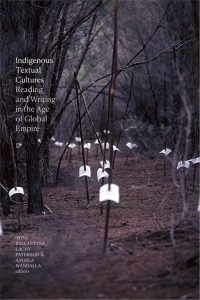 I have been fortunate to see a couple of publications appear this year. Indigenous Textual Cultures: Reading and Writing in the Age of Global Empire was recently published with Duke University Press, 2020. This project came out of a 2014 symposium in Dunedin featuring a number of eminent international scholars, and Tony Ballanyne, Angela Wanhalla and I co-edited the collection of essays that came out of the symposium.
I have been fortunate to see a couple of publications appear this year. Indigenous Textual Cultures: Reading and Writing in the Age of Global Empire was recently published with Duke University Press, 2020. This project came out of a 2014 symposium in Dunedin featuring a number of eminent international scholars, and Tony Ballanyne, Angela Wanhalla and I co-edited the collection of essays that came out of the symposium.
Sometimes things take time. I attended a symposium on colonial newspapers at Yale University in 2017, looking at the notion of Habermas’s “public sphere” within colonial societies, presenting on Wellington Māori letters in Te Karere o Poneke in the 1850s. This was recently published as “Te Karere o Poneke: Creating an Indigenous Discursive Space?” in “Special Issue: Colonial Public Spheres and the Worlds of Print”, Itinerario: Journal of Imperial and Global Interactions,44, 2 (2020) edited by Emma Hunter and Leslie James.
My argument is that if you used the conditions of the Habermasian model of a public sphere (a rather Eurocentric theory) it was difficult to apply to Māori of the Wellington period in the 1850s. They were not urban, bourgeois, or anti-clerical, nor in control of the media. But the impact of colonialism nevertheless gave them new ways of looking at the world, and that this newspaper gave plenty of scope for them to articulate them.
I have also submitted a chapter, “Race and Revolution: Haiti and the Kīngitanga, 1863” for a new book, edited by Lyndall Ryan and Angela Wanhalla, on Aftermaths: Remembering Colonial Violence in New Zealand, Australia and the Pacific. This should appear with Otago University Press in 2021. I was also asked to contribute a case study for the planned Edinburgh Companion to British Colonial Periodicals, and have written (but not yet submitted) a piece entitled, “Making Māori citizens in Colonial New Zealand: the Role of Government Niupepa.” I anticipate this coming out in 2022 with Edinburgh University Press.
Another project is to write a book on Māori print culture, from the first book in 1815 through to the present. I have pretty much written a draft, but this needs some extra work and refinement. And as Paerau mentioned above, he, Megan Pōtiki and I have a planned edited collection on Māori-language texts that we plan to get on to when we have a spare breath.
Te Tumu input into international cancer research
Regular readers of this blog will know of Karyn Paringatai’s research work. Not only is she an award-winning teacher, an advanced te reo Māori practitioner, and kapa haka aficionado, but she is also undertaking Marsden-funded research on Māori and gastric cancer in collaboration with Professor Parry Guilford of the university’s Centre for Translation Cancer Research. What follows is an update of this research, and some media links for those wanting more information.
Hereditary diffuse gastric cancer (HDGC): updated clinical practice guidelines
Māori are three times more likely to develop stomach cancer than people of European descent. Māori are one of the few populations worldwide where diffuse-type gastric cancer is more common than intestinal-type stomach cancer. Diffuse gastric cancer is an aggresive type of cancer that grows rapidly in the cells of the stomach wall – it does not form a mass or a tumour. These cancer cells spread widely and quickly and it makes it difficult to diagnose. The reasons for this high occurrence of diffuse stomach cancer are unclear but a relatively high frequency of the inherited CDH1 variants in the Māori population is one important reason. When working properly the CDH1 gene controls the growth of cells. But because it has mutated it allows cells to grow uncontrollably – including cancer cells. This genetic mutation is particularly prevalent amongst Māori, but many are unaware of the risk.
When Dr Karyn Paringatai was tested for a CDH1 variant 11 years there were only 3-4 Māori whānau with mutations in this particular gene. That number has since increased to between 12-15 Māori whānau. This prompted researchers and health professionals working in this area and affected whānau and families from all around the world to gather in Wānaka in March 2019 to update the previous management guidelines for HDGC published in 2015. A number of important new and revised recommendations are made in these updated guidelines, which was recently published by Lancet Oncology. However, most pertinent to Māori was that the whānau of any Māori person who has been diagnosed with diffuse stomach cancer be encouraged to have a genetic test, regardless of any other family history. Previously, the guidelines were largely based around the number of cases of this cancer in a family. 11 years ago Karyn had to fight to be tested and prove that she was at risk of HDGC, which was tough to do with her scant knowledge of her whānau’s medical history. That is no longer the case.
Professor Parry Guilford (Te Aho Matatu, Centre for Translation Cancer Research, University of Otago), the lead author of the article, states, “It is very uncommon in international guidelines to single out sub populations, so this is quite a significant move that we hope will reduce their risk as well as helping to reduce inequities in health for Māori.” Karyn, a co-author of these guidelines, is actively encouraging Māori to be tested and to make contact with her for any advice on how to do so. It is important to do so – for the future of our whakapapa.
This research is linked to Karyn’s Marsden funded project E kore au e ngaro – The enduring legacy of whakapapa.
Click here for a link to the updated guidelines in Lancet Oncology
Click on the links in the titles below to access media reports.
| Three, Newshub Live at 6pm, 10/08/2020, Samantha Hayes and Mike McRoberts |
| There are likely to be several hundred Maori unaware they are at high risk of an inherited form of stomach cancer, a New Zealand research team has suggested. The team from the University of Otago is hopeful updated international clinical practice guidelines they helped develop will encourage these people to be tested. |
| Radio NZ – National, Checkpoint, 10/08/2020, Lisa Owen |
| Report by Meriana Johnsen. A move to make it easier to get tested for stomach cancer is expected to save the lives of whanau Maori, and in particular, the several hundred Maori who are unaware they are at risk. New guidelines developed by the University of Otago and Kimihauora Research Clinic allow Maori to be tested for the genetic mutation CDH1 even if there is only one other family member with stomach cancer. |
| Radio NZ – National, 15:00 News, 10/08/2020 | |||||||
| A new testing criterion for identifying stomach cancer developed by Otago University and the Kimihauora Research Clinic is anticipated to save the lives of whanau Maori. Otago University’s Senior Lecturer at the School of Maori, Pacific, and Indigenous Studies Karyn Paringatai says Maori would have fewer holes to jump through.
|
|||||||
| Stomach cancer test to save whanau Maori lives | |||||||
| Radio New Zealand, Other, 10/08/2020 | |||||||
| A move to make it easier to get tested for stomach cancer is expected to save the lives of whānau Māori, and in particular, the several hundred Māori who are unaware they are at risk. New guidelines developed by the University of Otago and Kimihauora Research Clinic allow Maori to be tested for the genetic mutation, CDH1, even if there is only one other family member with stomach cancer. |
| Testing expected to save Maori from stomach cancer |
| Radio New Zealand, Other, 10/08/2020 |
| A research team hopes Maori lives will be saved with a new testing criteria for stomach cancer. The University of Otago and Kimihauora Reseach Clinic have developed the new criteria to make it easier for Maori to be tested for the genetic mutation that leads to the cancer. |
| Changing international guidelines to save Maori lives |
| Radio New Zealand, Other, 10/08/2020 |
| Researchers have managed to get a change to international clinical guidelines to ensure Maori are tested for a gene which causes stomach cancer. Otago University Professor Parry Guilford explains to Jesse why this gene is more prevalent in Maori and can be identified before a person gets cancer. |
| New clinical guidelines for stomach cancer testing aim to improve outcomes for Maori |
| Newshub, Other, 10/08/2020, Dave Goosselink |
| An Otago University team has developed new clinical guidelines for testing stomach cancer in New Zealand – especially in Maori. Maori have a higher risk of developing the disease, due to a cancer-causing gene passed down through some whakapapa. |
| Research team hopes Maori lives will be saved with new testing criteria for stomach cancer |
| New Zealand Doctor Online, Other, 10/08/2020 |
| There are likely to be several hundred Maori unaware they are at high risk of an inherited form of stomach cancer and a New Zealand research team is hopeful updated international clinical practice guidelines they helped develop will encourage these people to be tested. The University of Otago and the Kimihauora Health and Research Clinic’s (Mt Maunganui) work in understanding the role of variants (mutations) in the CDH1 gene in familial stomach cancer and the subsequent development of a genetic test, has dramatically reduced the number of deaths from this form of inherited cancer. |
| A research team hopes Maori lives will be saved by new testing criteria for stomach cancer |
| NZCity, Other, 11/08/2020 |
| Otago University Professor Parry Guilford was part of the research team which in 1997, discovered a gene mutation that makes people more likely to get stomach cancer. He’s now helped develop a new set of testing guidelines for it. |
| Research team hopes Maori lives will be saved with new testing criteria for stomach cancer |
| University of Otago, Other, 10/08/2020, Liane Topham-Kindley |
| There are likely to be several hundred Maori unaware they are at high risk of an inherited form of stomach cancer and a New Zealand research team is hopeful updated international clinical practice guidelines they helped develop will encourage these people to be tested. The University of Otago and the Kimihauora Health and Research Clinic’s (Mt Maunganui) work in understanding the role of variants (mutations) in the I gene in familial stomach cancer and the subsequent development of a genetic test, has dramatically reduced the number of deaths from this form of inherited cancer. |
| Newstalk ZB (Auckland), 10:00 News, 11/08/2020 |
| Otago University Prof Parry Guilford has helped develop new testing guidelines for his 1997 research, with the hope that it will make it easier for Māori to get tests to find out if they have stomach cancer-causing genes. |
| Newstalk ZB (Auckland), 10:00 News, 11/08/2020 |
| Otago University Prof Parry Guilford has helped develop new testing guidelines for his 1997 research, with the hope that it will make it easier for Māori to get tests to find out if they have stomach cancer-causing genes. |
Fingers Crossed for Marsden Second Round
Te Pūtea Rangahau a Marsden/Marsden Fund is one of the most prestigious opportunities for externally-funded research grants, and highly competitive. The grants fund three-year research projects, as well as channel some income into the university. The Marsden Fund operates as a two-stage process. Although the quality of all the initial applications (where the research idea is pitched) tends to be very high, most applicants do not get invited to submit a full proposal. In the Humanities Panel just 26.1% got through to the second round, and in Social Sciences it was 22.6%. At the second round successfully gaining a grant then becomes a (roughly) 50/50 chance. So we can see, winning a Marsden is very hard, and getting through to the second round is worth acknowledging and celebrating.
It will now be an anxious time for our Te Tumu staff, Dr Lyn Carter and Dr Erica Newman, involved in preparing their full proposals.
Dr Lyn Carter is part of larger team led by Dr Pedersen Zari of Victoria University, with the project: Empowering Oceania Nature-based Urban Design: Knowledge sharing, Leadership and community Partnering in Climate Change Adaptation. This is a “standard” Marsden application, i.e. submitted by experienced researchers, most often as a team.
Summary: Climate change impacts settlements of Oceania, including Aotearoa, in significant ways. ‘Nature-based solutions’ (NbS) have great potential to address these impacts. Incorporating traditional knowledge into NbS will offer more culturally appropriate and long-term solutions, however links to wellbeing agendas have not been fully explored. This research investigates how well being can be strategically linked to ecologies, and how this can be harnessed to create ecologically resilient ‘Ocean cities’. Research into how the human-nature-climate nexus can be leveraged to enhance the effectiveness of NbS will make a significant contribution to the urban climate adaptation research in Aotearoa, the Pacific, and globally.
Dr Erica Newman project is a “fast-start” application, which are for early career researchers, often working by themselves. Her topic is: Journey Home: Descendants of Māori adoptees search for their tūrangawaewae.
Summary: Māori adoptees who have no knowledge of their Māori heritage pass the unknown to their descendants. Focusing on these descendants, this project will explore; how they identify with their taha Māori, avenues they have taken to connect to their taha Māori, and how they are accepted by their whānau and hapū. I will follow participants on their journey of discovery and will examine hapū membership eligibility. Oral narratives will be the primary base for this project with published and unpublished sources used to support and highlight issues the participants encounter. This will begin a new area of research that will highlight the issues of transracial adoption on identity and well-being for descendants of Māori adoptees in Aotearoa New Zealand. [Advisor: Associate Professor Angela Wanhalla.]
We all have our fingers crossed that Erica and Lyn’s projects make it through.
Mātauranga Māori at Otago
Te Tumu’s Dr Tangiwai Rewi’s research on Māori education features in the latest He Kitenga issue on Mātauranga Māori. Click here for the full story, as well as other amazing Māori research at the University of Otago.
Te Tumu in this year’s Marsden Round
This has been a great year for research in Te Tumu. Every November Te Pūtea Rangahau a Marsden (Marsden Fund), run by the Royal Society Te Apārangi, announces its forthcoming research grants. Winning a grant is a two stage process, with applicants having to get past a preliminary round, then develop their applications for the second round; they have about a 10% chance of success in the Humanities and Social Sciences panels. There are six successful applications within the Division of Humanities, three of which have a Te Tumu connection.
Dr Karyn Paringatai‘s project “E kore au e ngaro! The enduring legacy of whakapapa” ($823,000, Social Sciences panel) looks at how the knowledge of whakapapa can impact on health, with particular reference to Māori affected by the CDH1 cancer-causing gene. Click here for more information. Professor Parry Guilford, Director of Otago’s Centre for Translational Cancer Research, is an associate investigator on the project.
Associate Professor Lachy Paterson is a principal investigator alongside Associate Professor Angela Wanhalla (History Department) on “Te Hau Kāinga: Histories and Legacies of the Māori Home Front, 1939-1945” ($746,000, Social Sciences panel), exploring the lived experiences of Māori who remained in New Zealand during the Second World War. Click here for more information. Although the project begins next year, one of our undergraduate students, Haeata Watson, has already started a project looking at Ngāti Kahungunu experiences, funded through a Ngā Pae o te Māramatanga Summer Internship.
Both Karyn and Lachy are based in Te Tumu’s Māori Studies programme, occasionally teaching into the Indigenous Development programme. Karyn also coordinates the Master of Indigenous Studies programme.
Professor Merata Kawharu, who until recently held an adjunct position within Te Tumu but is now based at the Centre for Sustainability, was also successful. Her project, “A question of identity: how connected are Māori youth to ancestral marae, and does it matter?” ($605,000, Humanities panel) will investigate the relationships that young Māori have with their marae. Click here to find out more. Merata with be working with associate investigators, Dr Stephen McTaggart (University of Auckland), former Dean of Te Tumu, Professor Paul Tapsell (now at the University of Melbourne) and Dr Krushil Watene (Massey University).
Special thanks to Marjoleine Righarts, Research and Enterprise’s Research Advisor for Humanities who helped immensely with all the applications.
New book: Indigenous Pacific Approaches to Climate Change
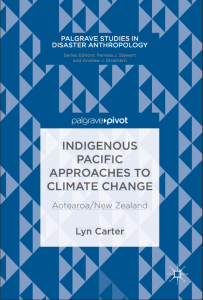 Climate Change is an issue for the Pacific. We are delighted to announce the lastest book by a Te Tumu scholar, Dr Lyn Carter, Indigenous Pacific Approaches to Climate Change, published as part of Palgrave’s Studies in Disaster Anthropology Series.
Climate Change is an issue for the Pacific. We are delighted to announce the lastest book by a Te Tumu scholar, Dr Lyn Carter, Indigenous Pacific Approaches to Climate Change, published as part of Palgrave’s Studies in Disaster Anthropology Series.
Dr Carter, a Ngāi Tahu scholar, is a member of Te Tumu’s Indigenous Development programme, and teaches the popular INDV301 course, Māori and Indigenous Development Ethics and Government.
From the publisher: “Situating Māori Ecological Knowledge (MEK) within traditional environmental knowledge (TEK) frameworks, this book recognizes that indigenous ecological knowledge contributes to our understanding of how we live in our world (our world views), and in turn, how we adapt to climate change.
“As an industrialized nation, Aotearoa/New Zealand (A/NZ) has responsibilities and obligations to other Pacific dwellers, including its indigenous populations. In this context, Lyn Carter discusses how A/NZ can benefit from the wider Pacific strategies already in place; how to meet its global obligations to reducing greenhouse gases; and how A/NZ can utilize MEK to achieve substantial inroads into long-term adaptation strategies and sustainable practices. Carter demonstrates that in all respects Māori tribal groups are well-placed to be key players: adaptation strategies, policies, and practices are integrated throughout Māori/Iwi traditional knowledge.”
Click here to access this new book.
Kei te piki tonu a Gianna! Further success for Gianna!
I te tau nei, ka whakapōtaetia a Gianna Leoni mō tāna tohu kairangi. I tēnei tau hoki, kua mahi ia hei kairangahau, hei pūkenga mō Te Tumu, engari, kua riro i a ia he tūranga hou, hei kairangahau postdoc i raro i a Ngā Pae o te Māramatanga. Ko tāna kaupapa rangahau, ko “Te Ōhanga o te Pīpīwharauroa – Expressing our Economic Aspirations”.
This year, Gianna Leoni graduated with her PhD. Also this year she has been working as a researcher and lecturer for Te Tumu, but she has gained a new position, that of a Ngā Pae o te Māramatanga postdoctoral fellow. Her research project is “Te Ōhanga o te Pīpīwharauroa – Expressing our Economic Aspirations”.
“The aim of this research is to enhance the contemporary Māori language of economic development that reflects a kaupapa Māori way of doing business. It will include historical research of language use regarding economic activity and an examination of current language use in economic activities, [including case studies] with the main objective of reintroducing and/or developing appropriate language that expresses economic activity.
“This research will allow for kaupapa Māori values to be included in Māori businesses using vocabulary that has a whakaaro Māori, not just transliterations, and that encompasses the philosophy of trading in a Māori way. In order to truly align with kaupapa Māori values, and to get buy-in from the community, economic activity needs the opportunity to be expressed in te reo Māori in all areas (eg. Finance) that are relevant to the stakeholders.
“This research will also contribute to the revitalisation and maintenance of te reo Māori and is extremely significant as Māori reach the ‘post-settlement’ era of Treaty of Waitangi negotiations where there is an increasing amount of economic engagement by Māori organisations.
“This research project links to the theme Whai Rawa. It aims to contribute towards developing tools, theories and models that will add value and profitability to diverse Māori enterprises, businesses & communities. It will contribute to creating new understandings and approaches for effective governance of these entities.
“This project will also link to a previously established Whai Rawa project, The intergenerational reality for Māori Small and Medium sized Enterprises (SME): Building resilience of Māori SMEs for the future. The exploration of Māori language as an expression of economic aspiration establishes a critical bridge to understanding the intergenerational reality of Māori SMEs today, and in the future”
Ka pai, Gianna!

